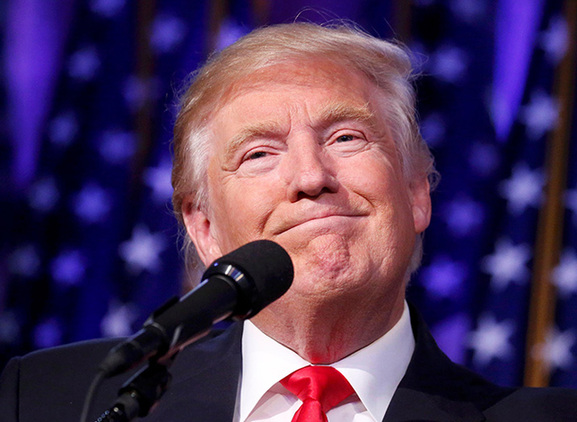Trump's problem with North Korea
china.org.cn / chinagate.cn by Sumantra Maitra, January 11, 2017 Adjust font size:
|
|
|
U.S. President-elect Donald Trump speaks at a rally in New York City on November 9 (XINHUA/REUTERS) |
It is commonsense that Donald Trump, in lack of better words, is unorthodox and unusual when it comes to diplomacy. He has a childlike obsession with Twitter, where he likes to launch broad tirades laced with tortured puns and tired sarcasms, against his real and perceived enemies. Some of it stems from his genuine beliefs about wrongs done to the United States and the victimhood he and his country faced since the collapse of the Soviet Union. According to this belief, the U.S. has suffered despite providing leadership in international affairs, because everyone took advantage. The second reason for his tweet diplomacy is a more simple psychological need of seeking validation and stems from relative insecurity and narcissism.
However, in one aspect his tweets are going to cause a major crisis soon, and that is with regards to North Korea. Xinhua sort of predicted it, but trust me, we in the West already know and are waiting for it to happen.
North Korea recently said that it wants to test a long range ICBM which is capable of reaching the U.S. mainland. This would indeed be a provocative act and the U.S. and Chinese governments are both understandably worried. However, a role reversal has happened, and it is not the U.S. but China which is now playing the responsible side. As The Washington Post reported, Donald Trump once wanted to invite Kim Jong-un to eat a hamburger and to persuade him to give up his nuclear ambition, but he more recently said that nuclear test must not happen.
It is at this stage it gets complicated. Diplomacy is not a linear effort. There are questions of perception and resolve which determine state action and even start conflicts. There are places and situations where ambiguity can be beneficial, but on the other hand, there are situations where ambiguity can be fatal. For example, in the days leading up to the Iraq invasion in 2003, there was flawed intelligence in the United States regarding Saddam's WMDs. Unfortunately, despite repeated threats, Iraq and Saddam couldn't come out and be clear about the fact that they didn't possess any WMD. The reason was more complicated than one can imagine. As subsequently revealed, Saddam was confused and was not even in charge of day to day running of the government, much less possessing and planning a WMD attack. But he couldn't come out with the information in fear of looking weak to his rival Iran and his domestic audience. International politics is strange, and perception of strength is extremely important.
As Doug Bandow of CATO wrote recently, China and United States have actually successfully worked on North Korea. Both countries agreed on U.N.-led sanctions, China pressured North Korea on participating in international negotiations and has repeatedly held talks with South Korea on helping to decrease tensions in the peninsula. However, China also doesn't want complete chaos right in its neighborhood. To ensure order, as recent events in the last two decades have shown, is much more important than chaos. And that has been and should be the guiding principle of any responsible great power.
Unfortunately that's a major problem and something Trump doesn't seem to understand. It takes a lot more than a few tweets to address a situation as complicated and historical as the Korean peninsula. The worst that can happen is it can send differing and contradictory signals to other powers including Japan, South Korea and China, not to mention it can send even potentially hostile signals to the North. The need of the hour is to diffuse the situation rather than exacerbate it, and Trump, despite his transactional businesslike approach to geopolitics, should understand that not everyone can "win" in every battle.
Sumantra Maitra is a columnist with China.org.cn. For more information please visit:
http://www.china.org.cn/opinion/SumantraMaitra.htm
Opinion articles reflect the views of their authors only, not necessarily those of China.org.cn.
